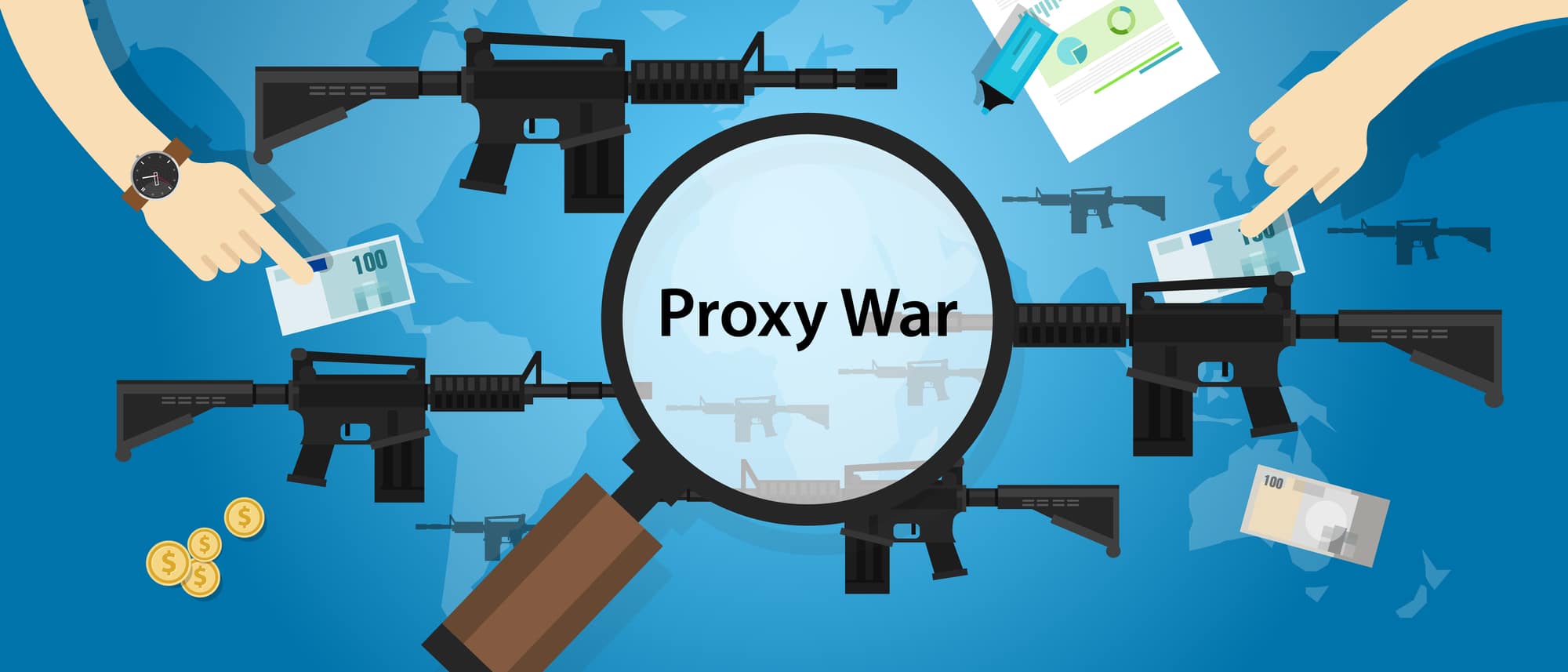NATO’s proxy war against Russia in Ukraine is attracting growing attention as it threatens to spiral out of control. There is ample reason for concern. What began as a limited military assistance program to Kiev from the United States and its European allies following Moscow’s expanded invasion of Ukraine in February 2022 has morphed into something much larger and more dangerous. NATO members are no longer just supplying Ukraine with weaponry that could arguably be described as purely defensive; they are equipping their Ukrainian proxy with far more destructive, long-range weapons capable of reaching targets deep inside Russia. In addition, the United States and other NATO governments are assisting Ukrainian attacks by providing crucial military intelligence, including targeting data.
By engaging in that conduct, the United States is violating some informal but very real rules governing previous proxy wars that Washington has waged against adversaries. One especially significant taboo barred attacks against the homelands of either the United States or its great power rival. By allowing Ukraine—much less members of NATO—to be involved in attacks inside Russia, Washington has trashed that prohibition. Such reckless behavior threatens to entangle America and NATO as a whole in the Ukraine war as an outright belligerent against a nuclear-armed Russia and risk triggering World War III.
The conflict in Ukraine is hardly the first proxy war in history or even during just the period since the end of World War II. Such ploys go back to the days of the Roman Empire and probably earlier. The Korean War in the early 1950s had distinct features of a proxy war. Joseph Stalin’s regime in the Soviet Union pushed its North Korean client to attack the Western-backed government in Seoul in an effort to unite Korea under communist rule. Washington (along with a few close allies) intervened to thwart that offensive and prop-up its anti-communist protectorate in South Korea.
The conflict threatened to become much more than a Korean civil war or a proxy war between the United States and the Soviet Union, however. Matters escalated sharply when Moscow’s prominent ally, communist China, intervened with its own troops. That development highlighted how clients, especially significant powers with their own policy agendas, can create a perilous situation during a proxy war even if the homelands of the two main players remain off limits. At one point, U.S. leaders considered attacking China, perhaps even using nuclear weapons. Such a move might have transformed the existing proxy war on the Korean Peninsula into a direct armed conflict between the United States and the Soviet Union.
The Vietnam War and the conflict in Afghanistan followed the proxy war script more closely than did the Korean War. Moscow (along with Beijing) gleefully provided hardware and other assistance to North Vietnam and communist forces in South Vietnam. That aid certainly helped Washington’s Vietnamese adversaries inflict major casualties on U.S. troops and wreck Washington’s policy goals. Nevertheless, the USSR and China did not contemplate intervening directly, nor did U.S. leaders contemplate striking back militarily at their major power tormentors. The guidelines for a proxy war held.
The same scenario took place following the Soviet Union’s invasion of Afghanistan in the late 1970s. This time, though, the roles were reversed from the situation in Vietnam. The USSR was the party to make the foolish, excessive military commitment against a Third World opponent and suffered a disastrous outcome similar to Washington’s folly in Vietnam. Again, however, the homelands of the two great powers remained sacrosanct, even though Washington’s clients, the Afghan mujahedeen, badly bloodied and humiliated the forces of the occupying Soviet military.
If the United States and its NATO allies had exercised similar restraint with respect to the war in Ukraine, we would not be facing a crisis. But policymakers in Washington and other NATO capitals were not content to abide by even the most essential restraints. They could have prohibited their Ukrainian client from conducting military operations outside of Ukraine’s pre-war territory. They could at least have prohibited attacks on indisputably Russian territory. Instead, they have encouraged and actively assisted a variety of assaults deep inside Russia.
Russian leaders now openly state that not just Ukraine, but NATO itself, is waging a war against their country. A key question is how long Moscow will continue to exercise patience and restraint and refrain from attacking an offending NATO member. Given the extent of their involvement in the Ukraine war and their support for Kiev’s maximalist policy goals, countries such as Poland, the Baltic republics, and Great Britain can no longer hide behind a phony status of non-belligerence. Nor can the United States. At a minimum, Washington has failed to compel either Ukraine or hyper-aggressive NATO partners to exercise caution. Worse, both the Biden and Trump administrations have authorized the United States to adopt reckless policies of its own.
U.S. and NATO leaders appear to be operating on the belief that the Kremlin will remain intimidated and passive because Putin and his associates realize that Russia cannot win a war against a united NATO. They might be right about the conclusions Russian policymakers would draw about the West’s military superiority. But leaders of a beleaguered great power don’t always reach the most prudent and rational conclusions. In 1941, many Japanese leaders, including Admiral Isoroku Yamamoto, the architect of the attack on Pearl Harbor, feared that their country would not be able to beat the United States in a major, prolonged war. However, because of Washington’s stifling oil and steel embargo, the alternative to war appeared to be Japan’s slow economic and military strangulation, culminating in national humiliation. Despite the adverse odds, they chose to roll the dice of warfare.
A cornered Russian bear, denied even basic respect from the West as a great power, may well reach a similar conclusion. A wise U.S. administration would end the ever-escalating NATO proxy war against Russia in Ukraine and do so immediately.

































